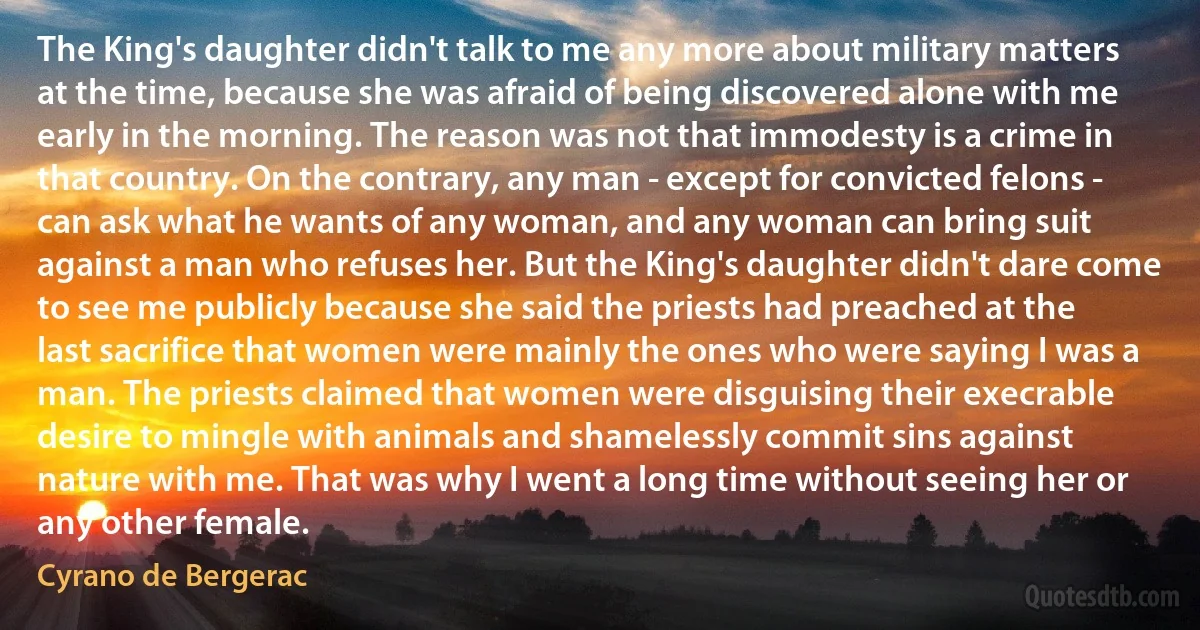
The King's daughter didn't talk to me any more about military matters at the time, because she was afraid of being discovered alone with me early in the morning. The reason was not that immodesty is a crime in that country. On the contrary, any man - except for convicted felons - can ask what he wants of any woman, and any woman can bring suit against a man who refuses her. But the King's daughter didn't dare come to see me publicly because she said the priests had preached at the last sacrifice that women were mainly the ones who were saying I was a man. The priests claimed that women were disguising their execrable desire to mingle with animals and shamelessly commit sins against nature with me. That was why I went a long time without seeing her or any other female.
Cyrano de BergeracRelated topics
ask commit country crime dare daughter desire disguising early female went women last man mingle morning nature ones reason say saying see seeing suit talk time womanRelated quotes
Where did you set your standard of faith? Do you desire the greatest blessing? I know you do. Are you willing to take up the cross? Do you know what Jesus said? He said, "He who loves his mother, his father, his wife, his brothers and sisters, his children more than me is not worthy of me. To come with me, you must bear your own cross." Jesus Christ, of course, was a pathfinder. He opened up the territory, the new way. In order to be adopted as a true son and daughter of God, those who followed his path must walk the same way. The time has come when the tears of civilized people are necessary. The tears of the millionaire are needed, The tears of the men of talent, the men of knowledge are needed. And their sweat. And even their blood. This is the only way we can expedite the restoration of the Kingdom of Heaven.

Sun Myung Moon
I had recklessly dared to do what I wouldn't dare to do today. The knight performs his morning prayer. When he is ready to pack up his chess set, he turns around, and there stands Death. 'Who are you?' asks the knight. 'I am Death.' Bengt Ekerot and I agreed that Death should have the features of a white clown. An amalgamation of a clown mask and a skull. It was a delicate and dangerous artistic move, which could have failed. Suddenly, an actor appears in whiteface, dressed all in black, and announces that he is Death. Everyone accepted the dramatic feat that he was Death, instead of saying, 'Come on now, don't try to put something over us! You can't fool us! We can see that you are just a talented actor who is painted white and clad in black! You're not Death at all!

Ingmar Bergman
I saw a moving sight the other morning before breakfast in a little hotel where I slept in the dusty fields. The young man of the house shot a little wolf called coyote in the early morning. The little heroic animal lay on the ground, with his big furry ears, and his clean white teeth, and his little cheerful body, but his little brave life was gone. It made me think how brave all living things are. Here little coyote was, without any clothes or house or books or anything, with nothing to pay his way with, and risking his life so cheerfully - and losing it - just to see if he could pick up a meal near the hotel. He was doing his coyote-business like a hero, and you must do your boy-business, and I my man-business bravely, too, or else we won't be worth as much as a little coyote.

William James
Hutte, for instance, used to quote the case of a fellow he called "the beach man ". This man had spent forty years of his life on beaches or by the sides of swimming pools, chatting pleasantly with summer visitors and rich idlers. He is to be seen, in his bathing costume, in the corners and backgrounds of holiday snaps, among groups of happy people, but no one knew his name and why he was there. And no one noticed when one day he vanished from the photographs. I did not dare tell Hutte, but I felt that " the beach man " was myself. Though it would not surprised him if I had confessed it. Hutte was always saying that, in the end, we we're all " beach men " and that the sand keeps the traces of our footsteps only a few moments "

Patrick Modiano
We alone can be wracked with doubt, and we alone have been provoked by that epistemic itch to seek a remedy: better truth-seeking methods. Wanting to keep better track of our food supplies, our territories, our families, our enemies, we discovered the benefits of talking it over with others, asking questions, passing on lore. We invented culture. Then we invented measuring, and arithmetic, and maps, and writing. These communicative and recording innovations come with a built-in ideal: truth. The point of asking questions is to find true answers; the point of measuring is to measure accurately; the point of making maps is to find your way to your destination. ... In short, the goal of truth goes without saying, in every human culture.

Daniel Dennett
